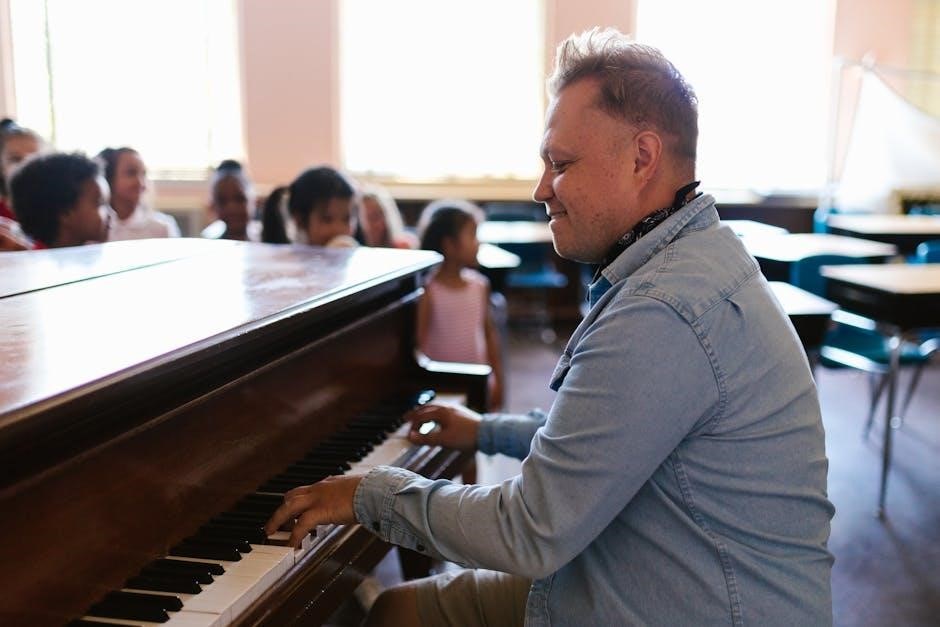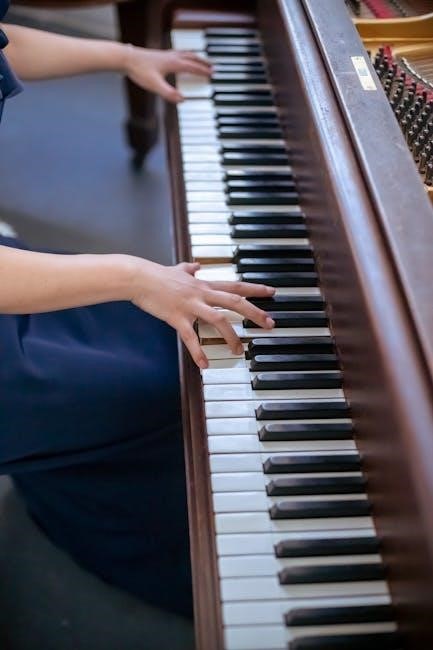August Wilson, a Pulitzer Prize-winning playwright, is celebrated for his profound portrayal of African American life through works like The Piano Lesson. His plays, part of the Pittsburgh Cycle, explore themes of identity, heritage, and societal challenges, making him a cornerstone of American theater. Wilson’s legacy highlights the cultural richness and resilience of African American communities, resonating deeply with audiences and scholars alike.
1.1. August Wilson’s Contribution to African American Theater
August Wilson’s plays, including The Piano Lesson, profoundly explore African American identity, heritage, and cultural resilience. His works, part of the Pittsburgh Cycle, offer a decade-by-decade examination of Black life in the 20th century. Wilson’s unique voice and storytelling have reshaped American theater, emphasizing the importance of African American history and experience. His contributions have earned acclaim, including Pulitzer Prizes, and continue to inspire new generations of artists and scholars.
1.2. Overview of the Pittsburgh Cycle Plays
August Wilson’s Pittsburgh Cycle includes 10 plays, each set in a different decade of the 20th century, exploring African American life. Works like Gem of the Ocean (1900s), Ma Rainey’s Black Bottom (1920s), and The Piano Lesson (1930s) highlight themes of identity, migration, and cultural resilience. The cycle captures the Black experience through historical and emotional depth, cementing Wilson’s legacy as a chronicler of African American history and culture.

The Piano Lesson Play Summary
Set in 1936 Pittsburgh during the Great Depression, The Piano Lesson centers on the clash between Boy Willie and Berniece over their family’s ancestral piano, a symbol of their heritage and struggles.
2.1. Setting: 1936 Pittsburgh During the Great Depression
The play unfolds in Pittsburgh during the Great Depression, a time of economic hardship. The Charles’ household, shared by Doaker, Berniece, and her daughter, serves as the primary setting. The city’s industrial backdrop and the family’s modest home reflect the struggles faced by African Americans during this era. The setting underscores themes of economic survival and cultural preservation, central to the story’s tension.
2.2. Plot Overview: The Dispute Over the Family Heirloom Piano
The play centers on a heated dispute between siblings Boy Willie and Berniece over their family’s heirloom piano. Carved with ancestral images, the piano holds deep cultural and historical significance. Boy Willie, determined to sell it to buy land, clashes with Berniece, who insists on preserving the family’s heritage. Their conflict explores themes of identity, tradition, and economic survival, revealing the emotional and historical weight of the piano.

Key Characters in The Piano Lesson
The play revolves around Boy Willie, the ambitious brother; Berniece, the protective sister; and Doaker, the wise family historian, each embodying different perspectives on heritage and survival.
3.1. Boy Willie: The Ambitious and Determined Brother
Boy Willie is portrayed as a driven and ambitious character, eager to improve his socio-economic status. His determination is evident through his desire to sell the family heirloom piano to acquire land, reflecting his focus on economic survival. This ambition often clashes with his sister Berniece’s commitment to preserving their family’s history, creating tension within the story. His character embodies the struggle between heritage and progress, central to the play’s themes.

3.2. Berniece: The Guardian of Family Heritage
Berniece is a protective and emotionally charged character who embodies the preservation of her family’s cultural legacy. She fiercely guards the ancestral piano, viewing it as a sacred symbol of their history and identity. Her refusal to sell the piano stems from a deep connection to the past, which often places her at odds with her brother Boy Willie’s pragmatic desires. Berniece’s firm stance highlights her role as a defender of heritage.
3.3. Doaker: The Voice of Family History
Doaker, the uncle of Boy Willie and Berniece, serves as the family historian and moral anchor. A 47-year-old railroad worker, he has witnessed the struggles of his family and community. Doaker’s calm demeanor and wisdom provide balance to the conflict between his siblings. He shares stories of their ancestors, emphasizing the piano’s historical significance. His presence underscores the importance of preserving cultural heritage, making him a vital link to the family’s past and identity.

Themes and Symbolism in The Piano Lesson
The play explores themes of heritage vs. economic survival and identity through the piano, symbolizing the family’s history and cultural legacy, central to African American experiences.
4.1. The Struggle Between Heritage and Economic Survival
In The Piano Lesson, August Wilson explores the tension between preserving cultural heritage and seeking economic survival during the Great Depression. The piano, carved with ancestral images, symbolizes the family’s history and identity. Boy Willie’s desire to sell it for land represents a practical need, while Berniece’s refusal embodies a commitment to preserving their legacy. This conflict reflects the broader African American experience of balancing tradition with economic necessity amidst societal oppression.
4.2. The Piano as a Symbol of Family History and Identity
The piano in August Wilson’s The Piano Lesson is a powerful symbol of the family’s history and identity. Carved with images of their enslaved ancestors, it represents their collective memory and cultural legacy. The piano serves as a tangible connection to their past, embodying the stories, struggles, and resilience of their family. Its presence bridges generations, making it a sacred object that defines who they are and where they come from, transcending its material value.

Cultural and Historical Context

Set in 1936 Pittsburgh during the Great Depression, The Piano Lesson reflects the cultural and historical struggles of African Americans facing economic hardship and societal oppression.
5.1. The Great Depression’s Impact on African Americans
The Great Depression exacerbated economic disparities for African Americans, who faced heightened unemployment and racial discrimination. In The Piano Lesson, this backdrop underscores the Charles family’s struggle, with characters like Boy Willie seeking salvation through land ownership. Wilson uses this era to highlight systemic inequities and the resilience of African American communities, emphasizing themes of survival and cultural preservation amidst economic hardship and social injustice.
5.2. The Play’s Connection to the African American Experience
The Piano Lesson deeply reflects the African American experience, exploring themes of identity, cultural preservation, and resilience. The play highlights the historical and emotional weight of the piano, symbolizing the legacy of enslavement and the struggle for freedom. Wilson’s work underscores the importance of preserving African American heritage while addressing systemic oppression and the quest for economic and social equality, resonating profoundly with the collective experience of Black Americans.
Adaptations and Performances
The Piano Lesson has seen multiple adaptations, including a successful 2023 Broadway revival and a Netflix film adaptation featuring John David Washington and Samuel L. Jackson.
6.1. The 2023 Broadway Revival and Its Success
The 2023 Broadway revival of The Piano Lesson became the highest-grossing August Wilson play in Broadway history. Directed by LaTanya Richardson Jackson, it featured a star-studded cast, including John David Washington and Danielle Brooks. The production received critical acclaim for its powerful performances and faithful adaptation of Wilson’s original work, solidifying its place as a landmark theatrical event.
6.2. Film Adaptations and Their Reception
August Wilson’s The Piano Lesson has been adapted into films, including a Netflix production starring Samuel L. Jackson and John David Washington. Directed by Malcolm Washington, the film premiered at the Telluride Film Festival and received acclaim for its faithful adaptation and powerful performances. This adaptation, part of Denzel Washington’s efforts to bring Wilson’s Pittsburgh Cycle to screen, highlights the enduring relevance of Wilson’s work in both theater and film, resonating with modern audiences.
Educational Resources and PDF Availability
Free PDF downloads of The Piano Lesson are available online for educational purposes, enabling students and scholars to study and analyze August Wilson’s work in depth. These resources, often found on platforms like ResearchGate, provide access to the play’s text, scholarly articles, and critical analyses, fostering a deeper understanding of its themes and cultural significance.
7;1. Free PDF Downloads for Study and Analysis
Free PDF downloads of The Piano Lesson are widely available online, offering convenient access for students, educators, and researchers. These downloadable versions provide the full text of August Wilson’s play, along with scholarly introductions and critical analyses. Platforms like ResearchGate and academic repositories host these resources, enabling in-depth study of the play’s themes, characters, and historical context. This accessibility fosters a broader understanding of Wilson’s work and its cultural significance.
7;2. Scholarly Articles and Research on The Piano Lesson
Scholarly articles and research on The Piano Lesson provide deep insights into its themes, characters, and cultural significance. Academic journals and university repositories offer analyses of Wilson’s exploration of heritage, identity, and family dynamics. These studies, such as “Vernacularizing the Blues On-Stage,” examine the play’s connection to African American experiences and its place in the Pittsburgh Cycle. Researchers and students can access these resources to enrich their understanding of Wilson’s acclaimed work.
Critical Reception and Impact
August Wilson’s The Piano Lesson received widespread acclaim, earning a Pulitzer Prize. Its exploration of cultural identity and family legacy continues to resonate, solidifying its theatrical impact.
8.1. Pulitzer Prize Recognition and Acclaim
The Piano Lesson earned August Wilson his second Pulitzer Prize in 1990. This recognition highlighted its profound exploration of African American heritage and family dynamics. The play’s success underscores Wilson’s ability to weave historical and emotional depth, making it a landmark in American theater. Its acclaim continues to inspire adaptations and scholarly discussions, cementing its legacy as a masterpiece of dramatic literature.
8.2. The Play’s Influence on Modern Theater
August Wilson’s The Piano Lesson has profoundly shaped modern theater by addressing racial identity and cultural heritage. Its exploration of family history and economic struggles resonates universally, influencing contemporary playwrights. The play’s adaptation into film and successful Broadway revivals highlight its enduring relevance. Wilson’s work continues to inspire new generations, ensuring his legacy as a pivotal figure in American drama and beyond.
August Wilson’s legacy endures through The Piano Lesson, a timeless exploration of heritage, identity, and resilience, continuing to inspire and resonate across generations in theater and beyond.
9.1. The Timeless Relevance of The Piano Lesson
August Wilson’s The Piano Lesson remains a powerful exploration of African American identity, heritage, and resilience. Set during the Great Depression, the play’s themes of family, history, and economic struggle continue to resonate. The dispute over the piano symbolizes the broader conflict between preserving cultural legacy and seeking economic survival, making it a timeless commentary on race, memory, and the American experience.
9.2. Final Thoughts on August Wilson’s Legacy
August Wilson’s legacy endures as a masterful storyteller of the African American experience. His Pulitzer Prize-winning works, like The Piano Lesson, captivate audiences with their emotional depth and cultural significance. Wilson’s ability to weave history, family, and identity into compelling narratives has left an indelible mark on theater. His plays continue to inspire new generations, ensuring his voice remains a vital part of American cultural discourse.



About the author